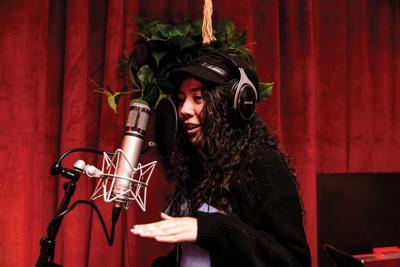Young people are struggling with mental health. Even before the COVID-19 pandemic forced students out of school and away from community, kids were facing an increased level of depression, anxiety and suicidal ideation, according to a 2021 report from the Centers for Disease Control and Prevention. In the decade leading up to 2020, the report shows steep increases in the percentage of young people with feelings of sadness and hopelessness, with more than 40 percent of young people in 2021 experiencing these symptoms persistently.
Jen Starsinic is the executive director of Girls Write Nashville, a nonprofit songwriting mentorship organization that works with female and nonbinary teens. She says that in Girls Write programs, organizers encounter young people who need help with a spectrum of mental health challenges, from general anxiety to depression and the effects of abuse. She says Girls Write participants often begin to process various traumas through forms of creative expression like writing lyrics and music. Girls and LGBTQ students in particular need support: The same CDC report shows that more than 60 percent of young girls say they experienced persistent feelings of hopelessness and sadness; that number jumps to 70 percent for LGBTQ youth.
“Definitely what we’re hearing and what we’re seeing and what we’re observing and … also seeing in data is that students are really struggling with their mental health,” Starsinic says. “They’re undergoing traumatic experiences, just like every person does, and not necessarily having a lot of resources for them.”
Michael Zuch, a licensed master social worker and clinical therapist at the Nashville Center for Trauma and Psychotherapy, says the pandemic “made it worse, as you can imagine. It just exacerbated the problems, though — so the problems are the same. They’re just deeper than they were before.”
Some of the concerns that come up generally in Zuch’s clientele — who are about 50 percent families and kids and 50 percent adults — are broad societal issues like political polarization, fear of mass shootings and climate change as well as typical types of abuse, trauma and neglect.
“What I think is great is that young people are more politically engaged, but there’s a cost, because they’re dealing with these huge existential questions without having the tools in the community to process them thoroughly in the same way that we adults do,” Zuch says. “Spaces where expression is used, like at Girls Write, really allow young people to build the community they’re looking for.”
In the case of Girls Write, and for many others working in spaces with children, there’s both a legal responsibility to report cases of abuse and the duty to do right by young people needing help, Starsinic says. It’s important to the organization to provide a space where young people are trusted, safe and able to get help when they need it.
The nonprofit’s annual fundraiser, set for Oct. 8 at 3rd and Lindsley, will feature Nashville artists and Scene faves Katie Pruitt and Daisha McBride, as well as four artists who either acted as Girls Write mentors or were in the program themselves: Crystal Rose, Purser, Magdalene and Eva Cassel. The benefit includes a push for funds for general services, but will focus partially on the crucial demand at the organization for a licensed clinical social worker to aid in case management and follow up with students experiencing crisis.
In his practice, Zuch works toward an understanding that there are various ways people can build community, which often improves their mental health. Zuch is careful to say social media is not damaging to young people on its own, but the internet is not always a helpful environment if kids don’t have the tools to understand what they are exposed to. He points to the positives of social media for necessary community building — especially for LGBTQ youth, who may find significant comradery among friends with similar experiences they find online. But the direct connection that music programs like Girls Write have with community building makes them a prime space for young people to both access mental health care and find like-minded peers, leading to better health outcomes overall.
“I think having more and more nuanced conversations and resources around [mental health] that moves beyond just the intellectual and into creating community together is, at the end of the day, what we’re all craving and what we’re not getting,” Zuch says. “And it’s what kids need too.”





